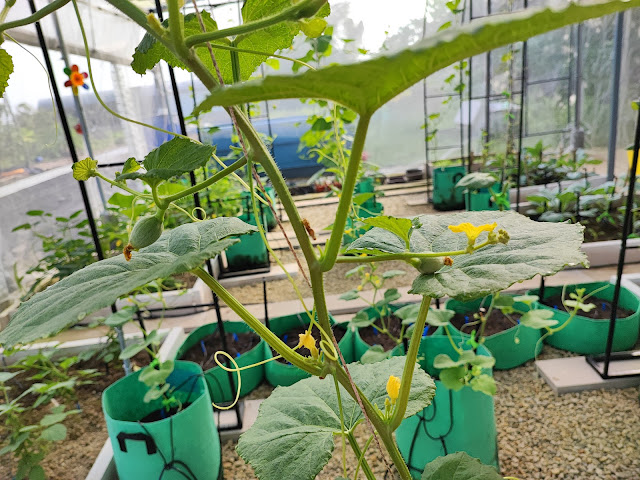Melon #1 Japan Sun Rise Melon
Background
We started seeding 6 types of melons on 31 Oct 2022. Generally, the planting guideline of sweet melons/cantaloupes from seed to harvest is around 80 to 90 days, assuming we did everything right.
We were hoping that we can have good harvest on last week of January 2023 which coincide with the lunar new year. (1st day of lunar new year is 22 Jan 2023, day 83 of melon journey).
This is just a general guideline. For specified cultivar, please refer to the seeds pack instruction for exact planting guide.
We used planting bags having 35cm diameter @ height of 40cm for all cultivars.
Note: This melon series focus on growing behaviours of difference melons in same settings, compare and contrast the different cultivars. This post is purely based on growers' observations, your results may vary.
This round, we are not very successful in term of the sweetness of the fruits. Probably due to constant rain 2 weeks before mass harvesting. Will need to improve and watch closely next round.
#PrettyJapMelon #ChampionOfTheBatch
Comparing to the rest, this Japanese melon cultivar's behaviours are very consistent across all plants. 85% of the seedlings behave very similarly in term of growth patterns/rate, flowering timing and fruiting outcome. All classic Japanese melons planting and pruning theories work on this cultivar too
Journey Of Growth
#Seedings #InitialGrowing #Cisbay #AGNLite #DaisoJapanSeeds
We used sunrise melon seeds from Diaso Japan. The seeds germination rate is closed to 90% and follows typical sprout pattern, most seeds sprouted on day 5 to 7. The seedlings are ready for transplant by Week 3. We use 10cm pot and put about 3 seeds to one pot.
The planting media are treated with goat poos and water with soil enzymes #AGNLite one week before transplant. Soil enzyme is again applied when mass flowering (week 6) and when fruits are growing rapidly after successful pollination (week 8)
Most vines started mass flowering with female flowers from week 5.5 onwards. Good pollination window is between week 5.5 to 6.5 from seeds. Good and healthy female flowers appeared from node 8 onwards. Vine length from surface of planting bag to the flowering nodes (node 8) is about 1 to 1.2m length for this cultivar.
Journey Of Pollination
We chose to pollinate all female flowers available from node 8 to 15 of each main vine following classic Japanese melon planting guide. For this cultivar, healthy female flowers are found at almost every node from 8 to 15.
If pollinated successfully, 3 to 5 days after pollination, there will be one dominant flower that will have the fruit double in size and growing very rapidly, in yellow circle below. There may be a second fruit that grows bigger too but at much slower rate. Can you spot it? This is observed on per vine basis.
Other successfully pollinated flowers will eventually stop growing and turn yellow and eventually dropped off or need to be pruned off.
Pruning And Trellis Support
#NeedTrellisToClimb #GoodPruningMatters
The trellis height must be at least about 2m height if you intend to have straight visible vine for easy spotting of nodes and melons.
All side vines below node 8 are pruned and removed from time to time. Keep at least 25 to 30 good leaves for the plant to perform good photosynthesis for plant food production. If you have space, can keep a few side vines after node 15.
Tip of the main vine is cut off between node 25 to 30 and/or above the well grown fruit and as long as we have at least 25 to 30 good leaves. (left side of the green ribbon in the picture shows where the tip is snipped off)
Ripening Journey
#FruitsAppearance
The fruit takes about 6 weeks from pollination to be fully ripen. It will need support from week 2 onwards. Netted skin appeared from week 2.5 - week 3 of pollination. Netted skin turns from green to light yellow last 3 to 5 days before it dislodged from the vine, vine ripen.
The fruit smell heavenly when ripe. The vine will dry off slightly too.
The final fruit has well netted exterior, bright orange fresh, sweet and juicy, the fresh is on soft side. Average size is 1kg as specified by seed vendor. Our biggest is 1.2kg.
To prevent the fruit from getting too soft, best to put the fruit immediately into the fridge, chill for a day, slice and serve chill. It tastes so so good.
Uniquely For This
#IAmUnique
It has everything that we wish for, pretty netted exterior, super fragrance when ripe, nice orange color, juicy and sweet, melt in the mouth. We will however prefer the fresh to be crunchy instead of soft. But I guess that is a personal preference.
The vine of this cultivar is very well behaved. Not very bushy, strong main vine without lots of messy disturbing side vines. It is a very good cultivar for tight growing space and perfect for people who prefers very neat garden.












Comments
Post a Comment